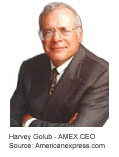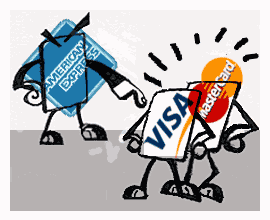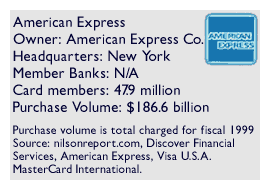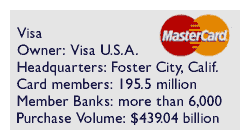|
Amex CEO takes stand
|
 |
July 5, 2000: 7:28 p.m. ET
Golub testifies that Visa/MasterCard hurt his business in federal antitrust trial
|
NEW YORK (CNNfn) - American Express Chairman and Chief Executive Officer Harvey Golub took the stand Wednesday in the government's continuing antitrust trial against credit card networks Visa and MasterCard.
Under questioning by Department of Justice lawyers, Golub testified that American Express invited banks to issue its cards, but nearly all refused because of an exclusivity rule Visa and MasterCard adopted prohibiting their own member banks from issuing competitors' cards.
 But in the cross-examination, Golub dashed and darted as MasterCard's attorneys tried to show that American Express has no trouble bringing its product to market and that it effectively competes with Visa and MasterCard. But in the cross-examination, Golub dashed and darted as MasterCard's attorneys tried to show that American Express has no trouble bringing its product to market and that it effectively competes with Visa and MasterCard.
Golub denied that an agreement with British bank NatWest to offer a United Airlines corporate credit card was done specifically to outmaneuver MasterCard.
"... We wanted to hopefully get more volume, but if it had a negative effect on MasterCard or Visa, I certainly wouldn't have objected to that," Golub said. "I would have been very enthusiastic about it."
Visa and MasterCard have gone all out to portray American Express as the sole instigator of the government's antitrust case against the two credit card networks.
In a forest of paper and reports issued by both Visa and MasterCard, the two networks accused American Express of hiring former Supreme Court nominee Robert Bork as a lobbyist to push the Justice Department into setting its antitrust guns on them.
An American Express document entitled "trench warfare" details a battle plan the company developed to pursue a DOJ lawsuit against Visa.
Two weeks ago, the government decided to drop its witnesses from Morgan Stanley's Discover Card, leaving mostly American Express witnesses.
 American Express dismisses the claim that it is the sole reason for the government's case, but the Justice Department has acknowledged that complaints from the New York-based company did factor into its decision to sue. American Express dismisses the claim that it is the sole reason for the government's case, but the Justice Department has acknowledged that complaints from the New York-based company did factor into its decision to sue.
In the trial, which began last month before Judge Barbara Jones in federal court in New York, Justice has been trying to show that Visa and MasterCard slapped a lock on nearly 80 percent of the U.S. credit card market through measures designed to shut out American Express and Discover.
The Justice Department sued Visa and MasterCard in late 1998 for alleged antitrust violations. The suit challenges an exclusivity rule adopted by both associations in which banks that issue their cards are prohibited from issuing a competitor's card, such as American Express or Discover. Doing so means being dropped from the Visa and MasterCard networks.
A second aspect of the suit contends that Visa and MasterCard are operating what is known as a "duality," in which the approximately 7,000 banks that operate both associations in the U.S. engage in collusion.
Duality permits each card association to install board members who hold a significant interest in the other's card. That means a Visa board member may have a significant MasterCard portfolio and vice versa.
Together, Visa, which is based in Foster City, Calif., and MasterCard, based in Purchase, N.Y., issue about 75 percent of the 500 million credit cards in circulation in the United States.
As of the first-quarter 2000, Visa U.S.A. had issued more than 250 million cards and posted annual purchase volume of $439.04 billion. MasterCard has 391.7 million card members worldwide with annual purchase volume of $242.5 billion, according to nilsonreport.com.
The Justice Department would like to do away with duality and open the banks to New York-based American Express and Riverwoods, Ill.-based Discover. Furthermore, Justice would like to see Visa and MasterCard issued by separate banks.
On the stand Wednesday, Golub testified that if American Express, which charges banks and merchants higher transaction fees than Visa and MasterCard, had access to those banks, the higher transaction costs would be countered by the upscale customers who spend more money that American Express would attract to the stores.
 Under cross-examination by MasterCard attorney James Egan, Golub acknowledged that he once sought some type of bank card distribution agreement with MasterCard in the 1990s, and even briefly discussed buying out MasterCard, both efforts designed to crush their competition. Under cross-examination by MasterCard attorney James Egan, Golub acknowledged that he once sought some type of bank card distribution agreement with MasterCard in the 1990s, and even briefly discussed buying out MasterCard, both efforts designed to crush their competition.
In their opening arguments last month, government lawyers, led by Melvin Schwarz, portrayed Visa as essentially one giant entity that controls nearly all of the U.S. credit card market, and one that has decisively tried to shut out competitors American Express and Discover.
Schwarz argued that the close-knit relationship between the two associations has hurt consumers by hampering innovation in the industry. The most prominent example of that harm has been the delayed introduction of so-called "smart cards" to the public. Had there been more competition between MasterCard and Visa, smart cards would have made their debut 15 years ago, Schwarz asserted.
In the mid-1980s, both MasterCard and Visa invested millions in developing technology for smart-cards, credit cards embedded with a silicon chip that, in addition to use as a regular credit card, can store its owner's medical history, bank records and other vital information.
 However, Justice argues that MasterCard, which was much closer to releasing its version of the smart card than Visa, agreed not to issue its cards until Visa caught up. However, Justice argues that MasterCard, which was much closer to releasing its version of the smart card than Visa, agreed not to issue its cards until Visa caught up.
Not so, say Visa and MasterCard. Their lawyers have argued that it would have cost too much to produce the cards and that consumers didn't go for them in pilot tests.
Subsequently, American Express rolled out its own version of the smart card, called "Blue," last year. Golub said American Express has issued between 1.5 million and 2 million Blue cards and that they have been wildly successful. He said the chips in the cards are loaded with an operating platform that, when swiped through an electronic reader, positively identifies its owner for added security. 
|
|
|
|
|
 |

|

